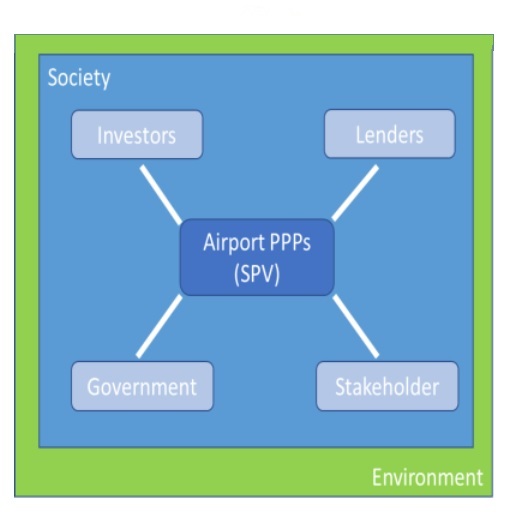How the Relationship Between ESG, SDGs and Airport PPPs is Evolving (Part 2 of 2)
Jacques Follain
Stephan Schwolgin
November 24, 2021

|
Commitments to ESG and SDGs are here to stay so finding ways to incorporate them efficiently into airport PPP models is essential. |
In Part 1 of this article we established the basics of why airport PPP projects can prove challenging when trying to incorporate sustainable development goals (SDGs) and environmental, social and governance (ESG) goals into the equation.
As these aspects are becoming increasingly important across all business sectors, they need to be incorporated into the current airport PP set-up. At its heart is are the concession special purpose vehicles (SPVs). They most often support a sustainability policy through a dedicated department within the operating company.
As mentioned in Part 1, SDGs related to environmental matters are a top priority for airport concessionaires who are used to implementing actions such as carbon accreditation – one of the latest being Delhi International Airport Ltd; energy saving and renewable energies projects like Stargate at Brussels Airport; rain and wastewater management and environmental compensations, just to name a few.
Embedding SDGs into Contracts
For governments and regulators, which are often eager to demonstrate their commitment to SDGs, the best way to ensure sustainable impact or performance would be to include these requirements in the concession agreement, unless they are embedded in their PPP and sectorial laws. Many airports, for example DFW (see video below), have already clearly outlined their holistic approach to ESG.
However, it appears very challenging to include ESG requirements in a long-term concession agreement as most ESG achievements and related performance measurement remain difficult to measure and clarify. In addition, although deeply committed to the achievement of SDGs, many equity investors remain cautious when negotiating such obligations as opaque and/or highly constraining objectives may affect their returns.
Nevertheless, we are convinced that once reliable measurement solutions are implemented, ESG goals should become a standard in elaborating airport PPP contracts. At this point it could be noted that the people-first PPP approach by UNDAC (United Nations Disaster Assessment and Coordination) has shown clear progress, as it has in other industries.
The Price For a Better World
Airport PPP groups and experts agree unanimously that additional SDG-related activities have an upfront investment requirement which need to be reflected in the business case of the respective airport concession. The industry will have to develop indicators and transparently report on ESG risk metrics dealing with the materiality of ESG issues that might not yet have been addressed.
Recent research, as conducted by the authors of this article, have shown that even if these activities are long-term, and might even outpace the concession period, they can have a financial benefit for the shareholders. That is aside of the gains for airport communities, individuals, and governments.
In this context, most of the airport PPP players, whether investors, operators, grantors or financiers admit that ESG and SDGs in airport PPPs are here to stay and that a sustainability commitment can be regarded, from now on, as a requisite to “a license to operate or hold an airport PPP” in today’s world.
____________________________________________
This article is based on the results of a comprehensive analysis on how airport PPPs manage SDGs and ESG, carried out by Stephan Schwolgin among major airports and airport PPP groups. It includes views from the airport PPP experts listed below who took part in a webinar organized by the WAPPP Airport Chapter in June 2021, with the support of Airport IR and Modalis. The discussion covered the topics of ESG, SDGs and sustainability in airport PPPs.
The webinar panel
- Jill Doucette, CEO, Synergy Enterprises (United Nations Institute for Training & Research, Modalis Expert Team)
- Serkan Kaptan, deputy CEO, TAV Airports Holding
- David Stanton, managing director, Ontario Airport Investment Ltd (Ontario Teacher’s Pension Plan)
- Roshnie Van der Zwan, ESG manager, finance department, Schiphol Airport Group
- Holger Schaefers, senior executive VP, global investment and management, Fraport
- André Van Hoeck, principal investment officer, infrastructure and natural resources, IFC
The moderators
- Melissa Peneycad, managing director, Institute for Sustainable Infrastructure
- Stephan M. Schwolgin, WAPPP member, Bangalore International Airport
- Jacques Follain, WAPPP steering committee member and chair of the WAPPP Airport Chapter
[Main image: LF Wade International Airport in Bermuda whose redevelopment was honored with an award from the Canadian Council for Public-Private Partnerships. Image courtesy of Bermuda Skyport Corporation.]

